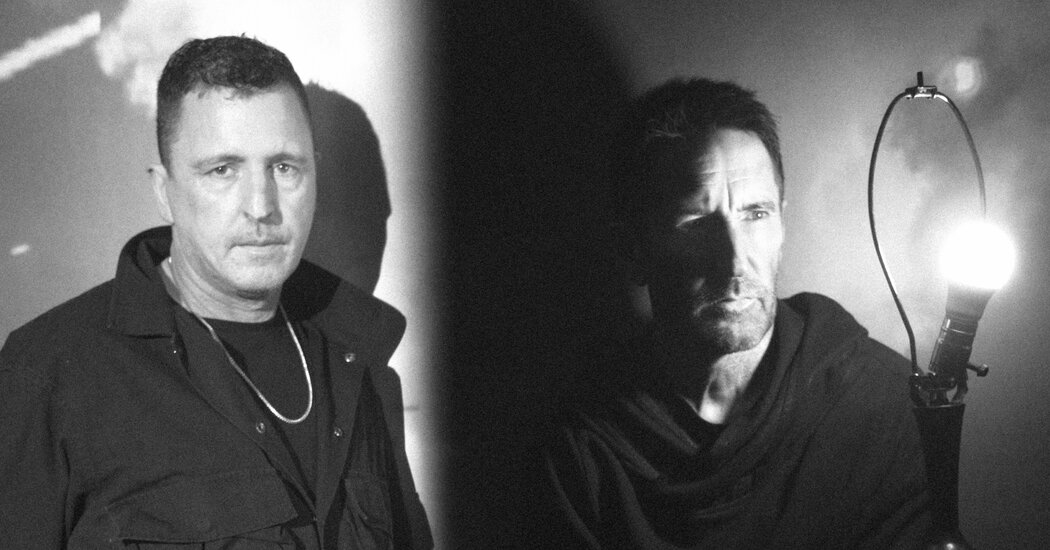Copyright The New York Times

Since 2011, when their first film score — the striking, unsettling music for David Fincher’s drama “The Social Network” — earned them an Oscar, Trent Reznor and Atticus Ross have enjoyed a remarkably prolific and consistent run as composers for movies and TV. They’ve showed impressive range across well over a dozen scores, including the kinetic electronic music for Luca Guadagnino’s 2024 tennis flick “Challengers”; their tense arrangements for Guadagnino’s current melodrama “After the Hunt”; and their jazz-influenced work for the 2020 Pixar movie “Soul,” for which the pair won a second Oscar. But their latest, written for the neon-streaked Disney extravaganza “Tron: Ares,” is the first on which they are credited as Nine Inch Nails, the pioneering industrial rock outfit that Reznor founded in 1988 and Ross joined in 2016. “It really had a significant impact on what ended up happening,” Reznor said in a recent video call. “It yielded something that wouldn’t have happened if it were called Trent and Atticus.” Reznor and Ross spend much of their time working side by side in the seclusion of their Los Angeles studio. But for this interview they were — for once — in different rooms, savoring a rare day off before the two hometown shows that closed out a recent leg of Nine Inch Nails’ triumphant Peel It Back Tour. Though known for their aesthetic severity and surly introversion — “We’re insular people who don’t want to hang out with other people, normally,” Reznor said at one point — the call revealed a flash of whimsy: A signed, framed headshot of a Ross favorite, David Hasselhoff, looked out from a shelf in his office. (“I like to keep treasured things around me,” he said and laughed.) The Peel It Back shows fuse impressive visuals with some exhilarating reworkings of Nine Inch Nails classics with help from the producer Boys Noize; like transforming the throbbing rocker “Closer” into a relentless club mix. “It’s a rock show, but it feels like it’s constructed in a new kind of way,” Ross said. “I’m not saying that arrogantly, but that’s just how I feel about it.” The pair had planned a Los Angeles festival focused on film music called Future Ruins for early November, but called it off “to re-think and re-evaluate,” the organizers wrote in a statement earlier this month. The score and the tour, which will continue next year, represent a new, rejuvenated period in the always-evolving band that Reznor has helmed for nearly four decades. “Nine Inch Nails was stagnant for a while because it didn’t particularly feel that interesting to me,” he said. “It didn’t feel creatively stagnant in terms of what had to be said, but the container it was in felt a little tedious.” Suddenly that has all changed. Now, for Reznor, being in Nine Inch Nails “feels vital and exciting again.” REZNOR I know I can speak for both of us when I say we’re uncomfortable congratulating ourselves or believing that we did good at something. It’s just kind of how we’re wired. ROSS We were so invested in the film from a creative point, and we knew zero about the film business and awards campaigns. So it was kind of like taking acid that lasted six weeks, with those kind of highs and lows. “Now you’re going to a lunch where so and so is going to be talking about this, and now you’re going to a tea, but do I have to wear a suit to that?” REZNOR The wonderful experience of “The Social Network” was working with an incredible partner, David Fincher, who is one the smartest people I’ve ever met, and was also one of the most nurturing. We felt like, “We don’t want to be the ones to ruin your movie because we don’t know what we’re doing.” Fincher taught us to trust our instinct and lean into that. To win the biggest award at the end of it was deeply into surreal territory. It felt amazing. And it also taught us that you’re still the same [expletive] the next day, but now you have a trophy on your shelf. The same hole is still inside your spirit. It didn’t fix you, although it felt nice for a minute. That’s not to downplay it at all, but it trained us in the bigger picture. To come to where we are now, which is: Why are we doing this? What’s the goal? It’s not to have another trophy. It’s to have the experience of working with interesting people that you learn from. That learning and that feeling of doing the best work we can do, that fills that hole up. What about your work on “Tron: Ares” makes it a Nine Inch Nails score? REZNOR We met [the president of Disney Music] Tom MacDougall when we scored “Soul” for Pixar. He came by a few years ago and said, “Would you be interested in scoring a new Tron film?” Yeah, we would be. Then he said: “Just have a think about this. Would it make sense to be Nine Inch Nails versus Trent and Atticus?” And I said, “Why do you think that would be a good idea?” He said, “I’m introducing the idea because we want to infuse it with personality and we want to take some risks on the film musically, and maybe it would lead to a different place.” By the time we actually started working on it, what started to reveal itself was that it changed the choices we made in terms of some of the sounds, and the inclusion of vocal songs. Nothing against Prince, but the last thing I would want to do is, you know, “Music Inspired by Batman.” Like, nothing to do with the film. It needs to feel like the DNA of what the score is. Our role is to help tell the story through score. And it yielded something that wouldn’t have happened if it were called Trent and Atticus. It gave the license to put some actual songs in there. ROSS The whole of the European tour, every moment we weren’t on a stage, we were in a traveling studio, in a hotel room trying to finish “Tron.” REZNOR It’s a lesson that’s impossible for us to learn. “Hey, ‘Tron’ is going to be done in February. OK, cool, we’ll start up a tour in May.” What do you think happens? “Now ‘Tron’ is going to be done in July.” You’d think we’d know better, but we don’t. Has composing scores changed the way you watch movies? Can you still get lost in a film, or are you always picking the score apart? REZNOR When I’m not on tour, I try to go at least every other week to a theater to watch a film, just because I like to get out of my head for a couple hours and not be me — get lost in something where I feel guilty if my phone buzzes, you know? I don’t pay attention to the score if I’m lost in the movie. I normally only do if it strikes me as: “Wow, this sucks. I’ve been taken out of the story because the music is demanding that.” Or the more rare occasion: “Wow, this is good.” Followed now by a tinge of jealousy. I think the last one I saw that did that was “28 Years Later.” The music for that was excellent. Have any other recent scores made you feel that way? REZNOR What Cristobal Tapia de Veer did with “White Lotus” had an incredible effect on how you felt about the show. The playfulness, the mischievousness, the absurdity of it — I think really did a lot to make that show be as effective and beloved as it is. ROSS “White Lotus” is a good example, because when that show came on — the opening titles — I’m already in.



